#actually being creations and being related to the abyss in essence
Explore tagged Tumblr posts
Text

𝐂𝐋𝐗𝐗𝐈𝐈. The release of the book collection Perinheri brought a few new details about Khaenri'ah that were mentioned previously one way or another but never specified more in depth as they do in this collection. One of the topics of interest I've found is the existence not only of the black sun and crimson moon as the astronomical phenomenons present there as the norm (solar and lunar eclipse respectively), but the names that the two dynasties take after: Crimson Moon Dynasty as the earliest upon Khaenri'ah's formation and Eclipse (or the old Blacksun) Dynasty, each name taking after the current astronomical phenomenon that Khaenri'ah is exposed.
Simultaneously, these two dynasties have aspects that differentiate them clearly from one another:
Crimson Moon Dynasty → During this period —which goes as far back in time as the times when birds had yet to be split into domestic and wild kindreds—, an orphanage was established in the pursuit of individuals who could transcend gods that came from outside the Kingdom. Said transcendent one never came, not even at the end of the Eclipse Dynasty punctuated by the Cataclysm.
A special command of knights existed that would no longer be present during the Eclipse Dynasty, and that is the Beastmaster Knights which used darksprites (riftwolves and their family of beasts) in order to fight outside sources of danger that poured from the Abyss. These darksprites are said to have been created via alchemy and more precisely yet, their first creator was none other than Gold.
Eclipse Dynasty → The period that came after the Crimson Moon Dynasty, known to be a darker one yet than the previous one. The prospect of using beasts to fight foreign sources that could bring dangers to the kingdom has fallen into disuse and instead, automatons began to be made and used in their stead. Nevertheless, towards the end of the civilization of Khaenri'ah these darksprites were being used in spying operations such as in Sumeru, or as a means of testing dangerous automatons in the making in outside factories.
Furthermore, it's relevant to mention that creation through alchemy continued even if these beasts weren't used anymore as part of the kingdom's military, granted that Gold aimed for bigger creations such as Durin and Elynas among other beasts as well as human creation with Albedo being her finest work of all that is known.
One last thing of interest is that the eclipse and the crimson moon were mentioned together in another instance that is Dain's official introduction:
◜[...] Chalk pursues gold, in this time inopportune, the eclipse is swallowed by the crimson moon. [...]◞

#◟༺✧༻◞ events to be remembered in blue veins ┊addendum.┊#the fact that Gold was the one who created darksprites#puts her in a timeframe that could predate the Archon War#or put her in the early stages of Khaenri'ah's foundation#in the beginning of the Apocalypse or after it#still before the Archon War for sure; as it's clearer now#that this happened after the Apocalypse#with the final showdown between dragons and gods#Dain's description here about the eclipse and the crimson moon#could be both about the astronomical phenomenons#or the actual dynasties#as in the kingdom struggling with inner strife#between the two dynasties for some reason#in a more literal translation from CN#it's said that the crimson moon is taking revenge of the eclipse#so... fun times it seems#it also makes more sense with the implications of all these beasts#actually being creations and being related to the abyss in essence#with the bit that follows in Dain's description: 'the future must atone for bygone mistakes'#because this isn't talked about enough#but everything related to the abyss even if the forbidden knowledge is gone#is /dangerous/ to all of T.eyvat as a world#and Dain is in a way doing that by butting heads with the Abyss Order#although when he was born and under what circumstances still remains to be seen
5 notes
·
View notes
Text

𝐂𝐗. Considering to write a small in-depth thing about the moment when Dain escapes Khaenri'ah up to the moment where the Realm of Farakhkert and Gavireh Lajavard are restored from the Black Cataclysm. I refuse to think that, knowing how much Khaenri'ahn civilians struggled to even go past the door that separates Khaenri'ah from Sumeru, he would leave with Lumine right after his job was done in this part of Sumeru without even checking if there are people still alive that he can help bring to the now safe surface. Within the sense of being lost and not knowing what his destiny is / what to do with his life now that he's been cursed and left with nothing, one strong reason to help with the purification of Sumeru could've been so the Khaenri'ahn civilians had somewhere safe to arrive after their arduous escape from literally hell.

𝐂𝐗𝐈. I'm in the process of writing a headcanon that encompasses Dain's escape from Khaenri'ah to the purification of Sumeru and an interesting thought came to mind. Considering Chlothar's fascination for that Cryo Abyss Herald, I can't help but think that there could've been other people —who didn't turn into what we know as abyssal creatures yet— sharing that fascination and actually opposing (violently) those who even dared to rise a finger against them. It's interesting to remember the fishiness behind Knight Marshal Anfortas' actions and his way to clean his own mess up related to these creatures and that he took King Irmin's place until an Alberich stepped in to become the regent (whether Anfortas was an Alberich or not I can't say nor it's relevant for this). We're talking about people who potentially saw success in defying the orders of the world and finding a way to oppose the Heavenly Principles, transcending the boundaries between mortality and monstrosity immortality. So there might've been chances that the fight that must've waged in Khaenri'ah had multiple layers is very strong:
✦ The gods. ✧ Rhinedottir's creations. ✦ Untransformed people who favored the transformed ones (not into Hilichurls, but into mages, heralds, etc) + automatons if they were able to control them. ✧ Transcendent ones (mages, heralds, etc).

𝐂𝐗𝐈𝐈. Been thinking about an old headcanon of mine saying that there is a faint glow in Dain's chest that comes from under his skin and twinkles in resonance with his heartbeat (blame it to We Will Be Reunited and how his chest glows when he dashes towards that portal) and I'm very tempted to solidify that his blood has been slowly replaced by Irminsul resin which in essence will do the same functions as blood does with the purifying factor. Additionally, this may serve as a new reason for Dain to remain sane and in good shape as he is despite all those centuries that have already passed.

𝐂𝐗𝐈𝐈𝐈. In the past I addressed the possibility that Lumine saying that Dain failed to protect Khaenri'ah wasn't entirely out of spite to hurt him and due to his open opposition to the Abyss Order (thus to her ideals also, or at least to her agenda), but because there is truth in that. While it is hard to think that an individual would be able to face several gods in order to do something substantial to protect the people of a corrupted kingdom (I say individual because in all fairness, it's unknown if he's truly human or something else— which if it were the case, it'd increase the odds of that being a possibility), I'm inclined to think that if he truly had the power to stand against them, he didn't for a reason.
As I didn't really have the means to further explain why I had this sudden thought in a reasonable way, I stopped talking about it and left it as a once in a lifetime thing to never touch again, until recently I read someone addressing the possibility that he was thrown into a trolley problem moment, and that's where the bulb lit up. Irregardless of whether he caught wind about the wrong in Khaenri'ah, he truly cared about his people and he would do everything in his power to protect them— but what if something would take precedence in his mind, to his grief, over focusing on Khaenri'ah?
This is where Irminsul appears and with it, the trolley problem.
What would he do? Focus his strength in protecting Khaenri'ah while Irminsul potentially dies and risk that those who survive this Cataclysm will have no place to live at all, not even under the Seven? Or focus it on protecting Irminsul instead, so those who survive will have somewhere to live without the fear that the world is ending?
If this is what Dain has to face and make a decision on his own in a moment where he had no time to think, then I think that the answer is very clear, as much as it would hurt. Then again, the reason why he's treated like some kind of traitor to Khaenri'ah could also be that he's opposing the Abyss Order and nothing else. But if Dain didn't have to face a complex situation that would lead him to focus his strength elsewhere that isn't Khaenri'ah, thus justify this way that he failed to protect the kingdom if he happened to have the power to do a substantial change for the better of Khaenri'ah against several gods— then it would be very hypocrite of Lumine, of all people, to tell him that when people thought that she'd bring hope and a change to their situation only to end in disaster.

𝐂𝐗𝐈𝐕. Thinking about this minicanon made me realize that taking this path, Dain would be exposed to more guilt for being unable to do anything to protect Khaenri'ah but at the same time, it would give him a stronger reason to lean towards saving the people of Teyvat even if it means going against those who used to be his people. Mainly because at this point he would want to do the damnedest so humanity won't go past the point of no return in which nothing can be done to save them, so prevention is a must. And in prevention is the hard work he's doing in opposing the Abyss Order, as they are a huge thorn on the side that can do a lot of harm to humanity and to the world itself.

𝐂𝐗𝐕. Sometimes I think about Dain's last act in this story being that he reweaves the threads of all fate, which makes me wonder: Is this related to the Abyss Order messing so badly with their Loom of Fate operation that needs to be undone? Is the constellation structure, most likely than not a control system (you can't tell me that the Archon War wasn't just that in order to get rid of all the several gods that existed in Teyvat save for very few in order to make it easier to control them and what they do :| )? Or maybe a combination of both? Whatever it is, it's the fact that the Traveler has to go over Dain first in order to do that which makes me believe that he can do it himself, alas—

𝐂𝐗𝐕𝐈. I have yet to finish watching the Fontaine livestream, but there is something that attracted my attention worth mentioning, as I’ve been talking about these two “semi-elements” in the past. It’s interesting to say the least that the new mechanic that encompasses both ousía and pneuma are under the name or arkhe, which I presume to come from αρχή which primarily means origin, beginning.
It’s also interesting the though, if they eventually expand more on these elements (I’m sure they will, they’ve been teasing it ever since 1.4, following Enkanomiya and then relevant lore in the quest line Khvarena of Good and Evil specifically, but also in Requiem of the Echoing Depths when Dain said that in the Chasm there is more than one strange power, which makes seeing souls not so strange), the concept that these two elements that represent chaos and order among many other things like darkness and light thematics would be the origin.

𝐂𝐗𝐕𝐈𝐈. Now that I had time to sit and watch the remainder of the livestream, I was able to revisit an interesting source that makes us have even more context about the chosen way to produce energy in Fontaine given that in the livestream is said that the Pneumousia method was established over 400 years ago by the hand of Alain Guillotine. This is very interesting as the source I referred to talks about both energies that would make Pneuma and Ousía in Fontaine, Khvarena and highly likely the Void, Abyss, you name it. Another curious thing to point out is that this is to prevent a tragedy to come that may or may not be related with the prophecy mentioned in the 4.0 trailer, but also the fact that Khaenri'ahn scriptures were involved into the studies that culminate later on in Fontaine's Pneumousia energy.

𝐂𝐗𝐕𝐈𝐈𝐈. The Narzissenkreuz Institute is home to orphans and children of crimilans watched over by an unnamed Oceanid as the Director and Basil Elton as the Vice Director, both of which would disappear and pass away during their fight against the Cataclysm respectively. This orphanage would house relevant figures such as: Alain and Mary-Ann Guillotin, Jakob and Karl Ingold, and René de Petrichor until its following disbandment when the Director and Vice Director were no more.
Alain, deemed a genius despite his young age, entered the Institute of Natural Philosophy where he worked into the mekas that would be preserved until present days while Mary-Ann entered the Marechausse Phantom. Despite their separate lives, they kept in touch whenever time restraints weren't as demanding— more from Alain's end than it was Mary-Ann's given that he was perpetually busy with his investigations, which included the study of ancient machines such as the ones built in Khaenri'ah and Al-Ahmar's. Concurrently, he was being assisted and used both by Jakob and René with their own discoveries that would entail into the Pneumousia controlled annihilation and, in turn, Alain's breakthroughs would serve them for their own investigations and experiments done concurrently in the Narzissenkreuz Ordo.
Said experiments were done in pursuit of a new human species (neohumans) that would survive a post-apocalyptic outcome already prophesied and witnessed with their own eyes. They would involve human experimentation most notably performed on Karl, who passed away as a result of them. Moreover, studies were performed on contained forbidden knowledge murk from the Chasm as well as Abyss-oriented ones that would give shape to neohumans such as Jakob and René before their return to Fontaine from their exploration in Sumeru grounds.
News about the Narzissenkreuz Ordo's immoral and harming practises would eventually reach the Court of Fontaine and, in order to stop them from continuing any further, the Marechausse Phantom were sent after them. Among them was Alain, who to some point decided to cut ties with René and Jakob, and Mary-Ann, thus leading to a fight in Elynas' interior in order to make them stop them from pursuing any further what they were intending to do— despite both of them having witnessed the apocalyptic future that Rene and Jakob prophesied.
If the Book of Revealing pages' order is to be trusted, René or a different individual born from him that shed his feelings and soul in his own pursuit was successful, helping himself with other human experiments to be put in abyssal barriers to later be part of a successful gestalt and potentially the Director's involvement as well. Many people passed away in the fight within Elynas and only of a few the outcome is known, such as Jakob retrieving blood from Elynas in the present or Mary-Ann being held in an idyllic landscape through the Looking Glass, shaped after a tale her best friend told her when she was young back in the Narzissenkreuz Institute.

𝐂𝐗𝐈𝐗. On the second Apocalypse.
It's important to describe what exactly makes an apocalypse be considered such and not described by other name (like cataclysm) if both are events harmful to Teyvat itself and the living beings that inhabit it. For this, I will make a comparison between Phanes' arrival to Teyvat and the Second Who Came + Nibelung descent with forbidden knowledge.
In the former, although it's unquestionable that the war waged between Phanes and whoever fought alongside him (if any), and the Dragon Sovereigns must've scarred Teyvat one way or another (we know from Sapientia Oramasdis II about the consequences it would take if Apep passed away by releasing all the Dendro energy within it as well as we know that some dragons perished in the combat be it during the first, the second fight when Nibelung brought forbidden knowledge and the Second Who Came arrived or in both, which must've led to consequences on a planetary level), it isn't stated to be in a relevant way worth mentioning. Here, the outcome was clear: the winner would inherit the right to reshape the world, whereas the loser would be subdued. Such was the dynamic between Phanes as the former and the Sovereign Dragons as the latter, and so Teyvat was recreated which caused it more hospitable for the soon-to-be created humans after that.
In the latter, however, it's different. Not only the fact that Nibelung, in all his wish to dethrone Phanes and the Saints, brought forbidden knowledge worsened matters both to himself, his fellow dragons and everything else— but the Second Who Came's presence as well made it so that the entirety of Teyvat as a planet was endangered and it ran the risk of being dying. Not the living beings that inhabit it alone, but the world in itself too. Among the consequences that have been stated, it's known that: forests turned into sand in Sumeru, there was an immense flood that drowned the unified civilization (Enkanomiya fell into an extraplanar conjunction point between the Human, Light and Void realms) and a breakthrough of the plague brought to this world (presumably Abyss energy-related). In order to mend this, Phanes dropped sapphire nails to prevent the world from crumbling so these would purify the land, thus destroying adjacent civilization as an undesired side-effect to his determination to protect Teyvat. Because of the importance of events that befell and what nearly caused to the world, this historical event would be more accurate to point as an apocalypse versus the former discord.
Given everything we've learned about the Cataclysm, even if one could argue that its relevance and what it caused to the world was negative and harmful (which it was), it wasn't on the same level as the apocalypse.
Although it has been teased before that in Snezhnaya it's known that the world will face a new Long Night (or at least among the Fatui, Harbingers and the Tsaritsa) and in René's notes that a catastrophe must be avoided at all costs, this patch of Fontaine shed more light onto what that means: the coming of a second apocalypse. An apocalypse described as a world where no more flowers will grow, a disaster defined for seeing a pool of blood past one's ankles, a world in which after a few hundred years, all birthing waters will dry up and after that, the world will be devoid of light with destroyed civilizations and a shattered sky that can be seen via two methods: through the Book of Revealing or the Looking Glass.
Whatever will lead Teyvat to this state remains unknown, but the Abyss Order's intentions are tellers of an outcome for the world far from desirable given their determination to plunge the whole world to darkness and overthrow Celestia with the power of the Abyss. In essence, the Abyss Order may not be any different than Celestia is due to their determination to potentially change the threads of fate in a similar fashion as there seems to be a divine control over fate that not all gods have access (the Archons) for their own purposes. Even if forbidden knowledge has been erased, there is still a latent star-devouring darkness that endangers Teyvat. Tsaritsa's involvement alongside her Fatui and Harbingers may also lead to undesirable consequences that could lead the world to its downfall, or Celestia's awakening and action may assist in that as well. Perhaps it's all three deeds at once.
This second apocalypse has been prophesied by René de Petrichor and Jakob Ingold, which is not an unlikely thing to happen. A relatively recent element, the Sign of Apaosha, is said to reflect the Abyss and corrupt the land around it (the sign), and it's believed to be a reflection of the "reality" beyond Teyvat's skies. Given that as per René's notes it's known that research on the Abyss [energy] was being conducted as well as other future research that I'll mention briefly, it's not impossible to have witnessed a catastrophe to come. Moreover, according to the Book of Revealing written by René, it's implied that other ancient civilizations might've been aware of this fact (at least the one of the Nameless City or underground palace in the depths of the Chasm, given that these ruins are displayed in the prophetic vision of the future).
On Fortuna.
Fortuna [that which happens without design, remarkable occurrence] (or world-formula, as termed by René) is described as the phenomenon that takes place when a civilization is destroyed and a new one is born from its ashes. Besides prophesying a second apocalypse to come in centuries (since 400 years ago), calculations made in regards of this subject reflect the outcome that no new civilizations will be born unless new variables are introduced "from outside the system". This would increase the magnitude of this catastrophe bound to come.
On the Neohuman Project.
This is the chosen variable by René de Petrichor in order to face the incoming crisis, or better said, ensure humanity's survival in the context that this apocalypse will take place no matter what, hence Teyvat will become an inhospitable world incompatible with life. Starting first with himself and then with Jakob Ingold, René's discoveries led him to learn that the composition of their bodies (changed as a result of these experiments) are closer to that of the Abyss and the Khvarena, paradoxical as it may be. Their bodies don't need nourishment like normal humans do and they possess terrifying self-recovery properties (fact-checked by extirpating ingrown organs close to vocal chords [albeit not for this purpose] and watching them regrow in a matter of few days) and in order to grow stronger, these bodies are nourished with the blood of fell beasts of the Abyss (Elynas in Jakob's case, albeit it was discovered that the Crimson Agate of Dragonspine and Elynas' blood share the same properties). In the present day, Jakob, in the body of an adult human, has been seen taking the form of an Iniquitous Baptist.
This project is seen as a manner of human transcendence in order to adapt to the hostile world that Teyvat will become if the prophecy becomes true. When the neohuman project proved to be difficult and a failure on a new experiment, a new variable has been introduced. Experiments were conducted in more humans and, albeit anti-intellectual and counter-intuitive, it's presumed that in order to transcend one's physical form and personality must be shed and lost and thus a gestalt where memories and other human souls are merged together similar to the principle of merging Oceanids into one by returning to the primordial waters. Ancients (presumably those of the Nameless City) have been already successful in this in the past. René, as the first subject in more modern times (400 years ago), was successful and he was able to see the memories of those human subjects that took part in this project.

0 notes
Text
Dark Souls Cooking: Estus Flask Recipe

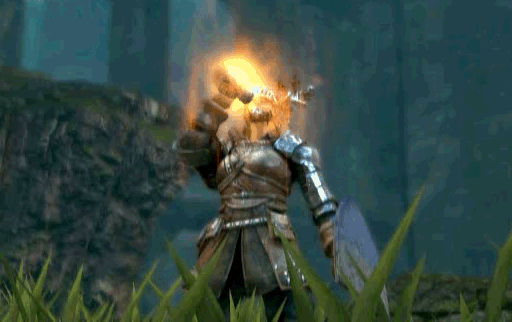
For the next video game recipe, we’re going to replicate the Estus draught from the Dark Souls franchise. I’ve already done Estus soup, but this time we’re delving deeper.
The player’s main source of healing is from these draughts of Estus, and they’re refilled when you rest at a bonfire. The player, as many of you know, is something called an ‘Undead’, because you’re cursed with the ‘Darksign’; you can’t stay dead, you eventually come back to life as spry as ever. But the more you die, the more ‘hollow’ you become until you’re one of the countless mindless zombies roaming the Dark Souls world.
And when the play dies, you respawn at the last bonfire you rested at. AKA, the player is ‘transported’ to the bonfire with their filled Estus flasks, looking a bit more wrinkly and zombie-like. Thing is, the story of Dark Souls places a huge emphasis on the twisting of time and space. So it’s not necessarily that the player’s body is warped back to the bonfire and re-animated, but more like you’re entering a different timeline where weren’t actually defeated. Possibly. It’s ambiguous like that.
So Estus is not the same magic that can actually revive felled Undead like the Darksign does. It’s not the force that’s converging entire countries closer together and putting lands into states of stasis. It’s not something that can reverse your hollowing progression. It’s something that, I guess, heals immediate stab wounds as they happen, and the like.
Also, not every character in-game is Undead. And the few confirmed non-undead NPCs are never shown drinking Estus. And the god Lloyd, a hunter of the Undead, uses a talisman that blocks Estus usage within a certain proximity. Perhaps Estus is indeed intricate to the Undead experience, as suggested by the item description, “The Undead treasure these dull green flasks.”
Basically, Estus itself is an energy that heals Undead, and Undead only. It’s refilled at bonfires, and there’s that whole Gwyn the God and First Flame thing that’s the main plot of the Souls series.
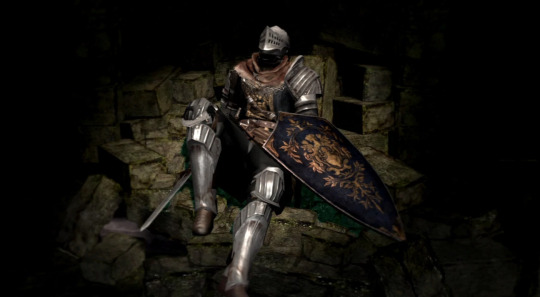
(“… Oh, one more thing … here, take this … an Estus Flask, an Undead favourite.”)
But Estus isn’t some holy magic. Humans exist almost in opposition to the divine of Dark Souls. We hold ‘humanity’ within ourselves, which is more closely related to the feared Abyss than the power of fire. Gwyn feared humanity. Humans are considered to be the catalyst of the age of Dark. We, as human Undead, are not reliant on fire the same way one might think when first introduced to the concept of Estus.
It’s the bonfires that heal the Undead when you sit at them. So since you refill your flasks at these bonfires, many people assume that Estus is just that. Bottled bonfire flame. After all, ‘aestus’ is latin for heat.
But there’s another interpretation - the Undead curse came into existence the same time Gwyn refused to let the Age of Fire pass, and tried to prolong the First Flame by throwing himself into it. The fact that Undead humans are revived at bonfires might be something of a side-effect of Gwyn’s pig-headedness. Humans are cursed to follow Gwyn’s footsteps in some roundabout, incoicidencial way. So long as this current Age of Fire is prolonged, we can’t die. We can’t move on. We’re all bound to fires and bonfires and the First Flame as prisoners.
Therefore, these bonfires exist throughout the world because they’re little branches of the First Flame, and your Undead curse is what reacts to the bonfires - not you specifically. So, we can say that drinking Estus is merely ‘prolonging’ your Undead curse, the same way that your Darksign is a product of Gwyn’s forced prolonging of this current Age.
So Estus isn’t the holy healing potion that people might think. It’s just bottled First Flame essence that increases your Undead life. Your Undead curse. Sure, fire can be warm and life-giving and all that, but not being able to ‘move on’ from this Age of Fire? Not being able to continue time, and stay forever bound to fire? Now that’s a curse.
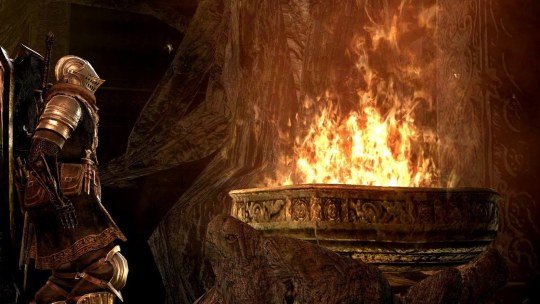
(The Dark Souls series has a lot of Eldritch writing, thanks to its use of manipulating time and space. Makes sense that FromSoftware’s next game (Bloodborne) was all about that Lovecraftian genre.)
Why is all this conjecture important? Well, I was wondering what my Estus recipe should taste like. If Estus was this holy healing magic, then that’s one direction. But I don’t think Estus is the nectar of the gods. It’s literally just fire, and the Undead covet them as healing sources even though its just reacting to their Darksign.
This realization almost makes this recipe harder to make. It’d be one thing if I was trying to replicate an angelic potion of heavenly sweetness and vanilla. I’ve no idea what fire is supposed to taste like.
In my Dark Souls Estus Soup recipe, I went towards the spicy direction, in order to emulate a burning sensation. This time around, the dedication towards canon is a more serious endeavor. After all, the idea of ‘Estus soup’ was kinda silly to begin with. Estus flasks, on the other hand, is the real deal.
Who of Dark Souls history invented Etsus? It’s never said. Dark Souls is split between two extremes - either there’s some deep, artsy lore behind why something is what it is, or we just kinda have to accept it because video game logic. There’s a reason why Filianore is cradling a cracked egg when you find her sleeping corpse, but there’s probably no lore reason why items in-game glow a shiny white sprite.
As far as the creation of Estus goes, our two clues are; the whole bonfire connection, and the description of the flask that holds it - “An emerald flask, from the Keeper's soul. She lives to protect the flame, and dies to protect it further.” Fire Keepers are people who dedicate their lives to tending and protecting a single bonfire throughout their lives. And in the last two Dark Souls games, they’re the only way you can level up.

(There is a theory that Estus soup is, in fact, boiled-down monsters or Undead. On rare occasions, you can get a free refill of Estus upon killing an enemy, kinda like how in Bloodborne, you get blood vials from killing enemies. So the Hunter harvest blood from their slain foes, and the Undead of Dark Souls can somehow absorb Estus energy on occasion. Hence, a theory on how Estus soup came to be.)
Fire Keepers are allies to the Undead. They protect the Bonfires, and therefore protect your sake. Protect from what, I don’t know. But they stand there all day, regardless. After all, the death of a Fire Keeper resulted in the snuffing of a Bonfire.
Although Estus isn’t divine ambrosia of the heavens, it’s still a concoction meant to serve you. To heal you. Not healing you of all curses and afflictions completely, but good enough. The reach of a Fire Keepers persists whenever you take a draught of Estus.
So you’re carrying around this flask of glowing liquid to swig whenever you get a Dragonslayer Arrow through your noggin. Therefore, to recreate Estus, I began thinking of protein shakes. Other people tend to go in the alcoholic direction, possibly as a homage to the whole ‘fire’ sensation. But I think of real-life Estus as a medicine rather than a drought of liquid courage.
If curing the Darksign was antibiotics, Estus would be Muscle Milk’s Non-Dairy Everyday Protein formula. Protein shakes aren’t as hokey as some might believe; while there’s no real evidence that building muscle requires a higher protein intake, using bodybuilding supplements can intake the protein (amino acids used to repair muscle tearing) while omitting the carbs, sugars, and salts irrelevant to maintaining muscle mass.
Basically, a protein shake contains the stuff you need to repair muscle micro-injury. You can imagine a magical version of a protein shake to instantly heal your sore muscles after a workout, complete with a firey kindling animation.
The most popular source of protein in theses shakes is whey protein. It contains all the amino acids humans cannot synthesize, and therefore must ingest throughout our diets. Soy, egg, and rice are also popular too. ‘Whey’, for those of you who don’t know, is part of the cheesemaking process - after the fat of milk has been curdled and removed to become cheese, the liquid that remains is called whey. Basically, it contains a lot of milk nutrients, without the fat.
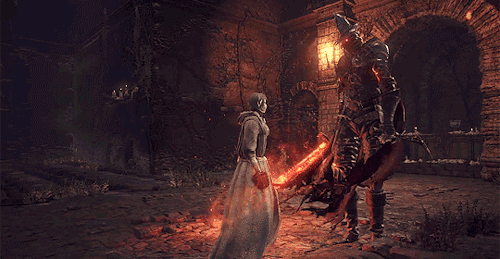
(Boss ahead. Therefore, try Praise The Sun.)
Now, I’ve tasted a few protein shakes myself. During the beginning of my hormone replacement therapy, my legs were getting so sore from simply walking down the street. I don’t eat a lot of meat, so I decided to get protein powder and add it to my coffee. There’s a sort of ... powdered milk aftertaste, but most overbearingly it’s the artificial flavoring of the powder itself.
And like Rocky has shown us, you don’t need branded protein powder to make a ‘protein shake’. Most popular protein-shake-from-scratch is with egg whites. However, using just eggs doesn’t result in a lot of protein, so people usually add more sources of protein such as peanut butter.
I do like the idea of using eggs. It’s poetic, since this is a ‘healing potion’, with that imagery of breaking an egg’s shell and consuming its fluid and yolk. However, consuming raw eggs in select countries (such as the USA) runs the risk of salmonella poisoning. Therefore, we’re going to use powdered egg yolk - its a popular ingredient for bakers. And only the yolk, because that’s a) where the protein is, and b) where we’ll get a nice source of yellow.
The entire ingredient list is;
3 tablespoons powdered egg yolk
2 scoops unflavored protein powder
A cup of almond milk
2-4 tablespoons raw honey
Pinch of turmeric, chipotle powder
As with all my video-game-cooking recipes, I choose all the ingredients to emulate the time and setting. Except this time Etsus is likely not supposed to be deconstructed into groceries a peasant could harvest. However, the rule still stands - almond milk was a popular drink during the plate armor days. Raw honey instead of purified white sugar.
The turmeric gives a deeper yellow color to the mix, and the chipotle provides the slightest smokey burn to the aftertaste. A pinch of either won’t be tasted when you take a swig, it’s only after you swallow do you feel the slight peppery bitterness of the turmeric, and the smokiness of the chipotle, along with a soft burn on your lips. Very true to Estus’ bonfire origins.
Making this protein shake is easy. Combine, stir/blend, and serve! It’s low calorie, great for energy, and it tastes perfectly decent.
Time to hit the road and reach that next bonfire, before finally tackling the boss.
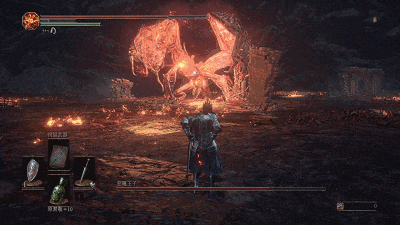
15 notes
·
View notes
Text
TAFSIR: Risale-i Nur: The Letters Collection:The Twenty-Ninth Letter.Part.59
The Sixth: Some of those who embark on spiritual journeying fall into an abyss by confusing the shades and shadows and partial samples of the stations of sainthood with its fundamental, universal stations. As is proved clearly in the Second Branch of the Twenty-Fourth Word and in others of the Words, the sun becomes numerous by means of mirrors and thousands of its similitudes possess light and heat like the sun itself, despite their paltriness in relation to the actual sun. In exactly the same way, the stations of the prophets and the great saints possess shades and shadows. Those who journey with the spirit enter these, and see themselves as greater than those great saints, or even to have advanced further than the prophets, and so fall into an abyss. However, the way to avoid this is to always take the principles of belief and fundamentals of the Shari‘a as one’s basis and guide, and to look on one’s illuminations and visions as opposed to them.
The Seventh: Some of the people of illumination and ecstasy fall into an abyss in their spiritual journeyings by preferring pride, complaint, ecstatic utterances, public regard, and being referred to, to offering thanks and supplication, beseeching Almighty God, and self-sufficiency. Whereas the highest degree is Muhammadan worship, which is termed “belovedness.” The basis and essence of worship is to manifest the perfection of that reality by supplicating and beseeching Almighty God, showing deep humility before Him, offering thanks, and through impotence and want, and by displaying self-sufficiency in the face of others. Some of the great saints have involuntarily and temporarily become proud and made complaints and ecstatic utterances, but they should not be followed voluntarily on such points; they are rightly-guided but not the guide; their way may not be taken!
The Eighth Abyss: Some of those who journey spiritually are self-centred and precipitate and want to consume in this world the fruits of sainthood, which will be given in the hereafter; they fall into an abyss by seeking them on their spiritual journeyings. But, as such verses as,
“The life of this world is but goods and chattels”(3:185)
proclaim, and as is proved decisively in many of the Words, a single fruit in the realm of eternity is superior to a thousand gardens in this fleeting world. For this reason, those blessed fruits should not be consumed here. If without being sought they are given to eat here, they should be thanked for, and deemed divine favours bestowed, not as reward, but for encouragement.
Ninth Allusion Here we shall describe briefly nine out of the truly numerous fruits and benefits of the Sufi path.
The First is the unfolding and clarification, by means of the Sufi paths that are on the straight way, of the truths of faith, which are the keys, sources, and springs of the eternal treasuries of everlasting happiness; it is their manifestation at the degree of the vision of certainty.
The Second: Since the Sufi path is a means of working the heart, the mainspring of the human machine, and of causing it to stir the other subtle faculties into motion, it drives them to fulfil the purposes of their creation and thus makes a person into a true human being.
The Third: On the journey to the Intermediate Realm and the hereafter, it is to join one of the lines of the Sufi orders, and become a member of its luminous caravan on the road to eternity. The person is thus saved from loneliness and finds the friendship of the other members in this world and in the Intermediate Realm; and relying on their consensus and accord in the face of the attacks of doubts and fears, and seeing each of their masters as a powerful support and proof, he repulses through them those doubts and instances of misguidance.
#allah#god#muslim#revert#revert help#reverthelp team#convert#convert help#new revert#new convert#new muslim#muslim convert#muslim revert#welcome to islam#revert to islam#convert to islam#how to convert to islam#prophet#muhammad#quran#sunnah#hadith#salah#dua#pray#prayer#muslimah#hijab
2 notes
·
View notes
Link
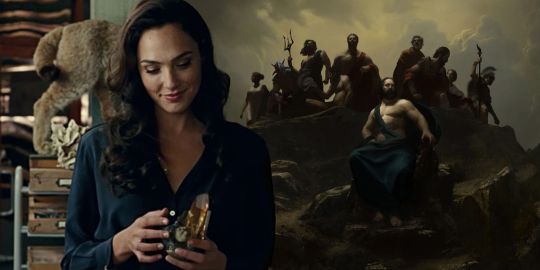
In the DC Extended Universe, the gods have a lot to do with the powerful artifacts bequeathed to heroes and villains alike. Wonder Woman 1984 showcases such an object: a stone forged by an Old God that gets into the wrong hands. There are other such treasures and weapons scattered throughout the universe. From its inception, the DCEU has showcased a number of them throughout the movies.
Wonder Woman is in possession of a great many gifts from the gods, but she is not alone. The films have introduced a few magical objects that were actually made by gods in an effort to imbue their champions with strength and fortitude. Each item is born by someone worthy enough to use its powers for good. This is the purpose behind the creation of each piece of equipment. When such items get into the hands of a greedy or power-hungry individual, however, they can have devastating consequences.
Related: What The DCEU Can Do After Wonder Woman 1984's Divisive Release
The artifacts created by the gods are boons to the heroes of the Justice League and those who aid the cause of righteousness. The films explore the power these objects deliver to their owners and those who would take advantage of the gifts of the Old Gods. Here is a breakdown of the tools created by the hands and materials of the gods. (Note: It should be noted here that, as with many items and characters in comic books, the origins of these objects have been retconned numerous times.)

Forged from the girdle of the Earth goddess Gaea, the Lasso of Truth is a creation of Hephaestus, the god of fire, smithing, and metallurgy. It is a weapon made to be indestructible and immutable, withstanding any battle. It can alter in length depending on the wielder's purpose. It has many powers, including the power to cast hypnosis, dispel illusions, restore repressed memories, and shield those in its circle from supernatural attacks. Its main capability, due to being imbued by the fires of Hestia, is to compel anyone held in its grasp to utter only the truth. This power is volatile, as it forces one to face the truth of their violent deeds.
In the wrong hands, the Lasso is great and terrible. Under the control of the villain Genocide, the weapon was used to attack the souls of her victims, bringing even powerful opponents to their knees. The tool has frightening potential, and it is necessary that one pure of heart be in control of its force. The tool, also dubbed the Golden Perfect, the lasso is Wonder Woman's primary weapon, and with her strength and speed, it can be used as both a defensive and offensive weapon, which fits her pacifist yet powerful fighting style.
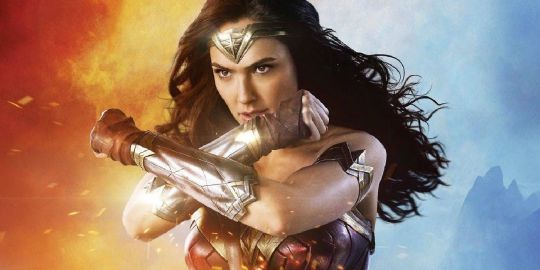
Worn by all the Amazons of Themyscira, the Bracelets of Submission are indestructible silver cuffs that symbolize years of bondage under the rule of the tyrannical Hercules. The bracelets protect against blasts, small missiles, and gunfire, serving as the main method of defense for every Amazon woman starting at age fifteen. When the Amazons reach that age, they pledge themselves in service to the goddess Aphrodite and are gifted the cuffs.
Related: Wonder Woman Becomes The DCEU's Superman AND Batman In 1984
Hephaestus modified the cuffs given to Diana, reinforcing them with Eighth Metal, a metal favored by the gods. The original cuffs were made from the metal of Athena's Olympian Aegis shield, not only protecting against bullets, but serving as a way to harness an Amazon's power, building up a massive strength boost when they are released.
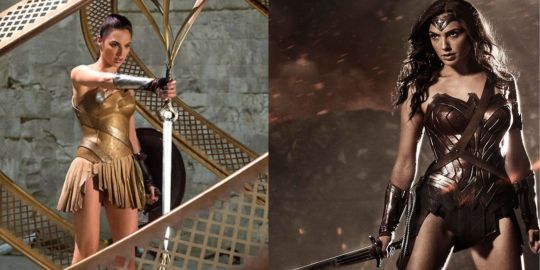
The God Killer, a creation of Hephaestus, was first offered to Deathstroke in order to assassinate an enemy of the Olympians, a mad Titan named Lapetus. The sharp and durable blade has also been seen in the wrong hands, both in the clutches of Grail, daughter of the New God Darkseid, in an attempt to usurp the throne from Hippolyta, and in the possession of Cheetah, Wonder Woman's foe. It is a powerful weapon, one that Diana is not sure she wants to wield. She retrieves the weapon from a tower in Themyscira, believing it to be the only thing powerful enough to destroy Ares, the God of War. Diana utilizes the sword on the battlefield as well as to dispatch General Ludendorff when she believes him to be Ares.
Ultimately, the real Ares reveals to Diana that the sword itself is not the God Killer, but that Diana is. Ares destroys the sword before Diana defeats him. The sword's remains have not been mentioned again in the DCEU. In Justice League, Diana has a new sword: the Sword of Athena. The weapon was created and wielded by the Olympian goddess of wisdom, crafts, and strategy, and it is gained by Diana sometime after World War I. Like its predecessor, the sword is extremely sharp and durable, even managing to slice off Doomsday's right arm. Diana is worthy of wielding the artifact, which has inscribed on the blade in Greek, "Life is killing life all the time, and so the goddess kills herself in sacrifice of her own animal."
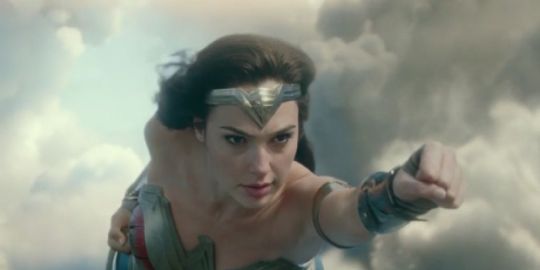
Also called the Talaria, the Sandals of Hermes are magical footwear that grants the wearer flight and enhanced speed. Though Wonder Woman has been in possession of these sandals on many occasions, she also gifts them to her allies in order to allow them access to those gifts. Wonder Woman has used the sandals to cross over the mystical field that separates Paradise Island from Man's World when she is needed or called upon. The Air of Chaos that acts as a barrier between the two realms is dangerous, but the sandals allow her to pass through it safely.
Related: Why Doesn't Wonder Woman Fly In BvS Or Justice League?
In different times through Wonder Woman's history, the sandals have been loaned out. During her time as Wonder Woman, Artemis wore the sandals. Diana's mother Hippolyta utilized them in her battle against Imperiex Probes. Teen Titan Cassandra Sandsmark used them for a short time after meeting Diana. An Amazon named Pythia stole them from Diana in an effort to find Harvard professor Julia Kapatelis. The sandals represent one of the many reasons that Wonder Woman is a worthy hero: she shares her power instead of hoarding it.

There are many stories of who created the Dreamstone, or Materioptikon. It is said to have been crafted by Dream of the Endless, also known as the Dream Ruby. Into the Dreamstone, Dream poured his essence, making it the most powerful of the twelve stones he created. In another version showcased in Wonder Woman 1984, the stone is created by an Old God named the Duke of Deception in order to incite chaos and misrule in the world. Touching the stone and speaking one's true wish would grant the deepest desires of humanity, but at a cost. Like the proverbial monkey's paw, the stone is not to be used lightly.
In the year 1984, the stone resurfaces at the Smithsonian Institute where Diana is working. It is being analyzed by geologist Barbara Minerva, but it is stolen by con artist Maxwell Lord, who has searched for the legendary stone for decades. He wishes to become the stone himself, gaining its wish-granting power as it drains him of health and energy. The Dreamstone wreaks havoc on the world, causing erratic, violent behavior in ordinary people, increasing murders and even plane crashes. As mayhem increases, Wonder Woman fears the power of wishing, and knows all the wishes must be undone. She forces Max to face the truth of his shortcomings, making him realize what truly matters to him and what his greed has done to the world.

It is not only tools and weapons created by the gods in an effort to aid their heroes, but entire places as well. Zeus created the isolated island in the Mediterranean Sea in order to protect his beloved creation the Amazons after their race was threatened by gods like Ares. The city-state is reminiscent of ancient Greece in architecture and climate, and it is protected by magical barriers that conceal it from the outside world.
Related: Wonder Woman 1984: Every Plot Hole Created By Steve Trevor's Return
For centuries after Zeus's creation of Paradise Island, the civilization of the Amazons flourished under the peaceful reign of Hippolyta, the mother of Diana. She knew that Ares would one day return, and so the warriors trained in the art of combat, surpassing the skills of men. The island remained undisturbed until 1918 when a pilot named Steve Trevor crash-landed off the coast and was rescued by Wonder Woman. Unfortunately, the German Navy was able to track Steve to Themyscira, bringing conflict and death to the immortal Amazons once more.
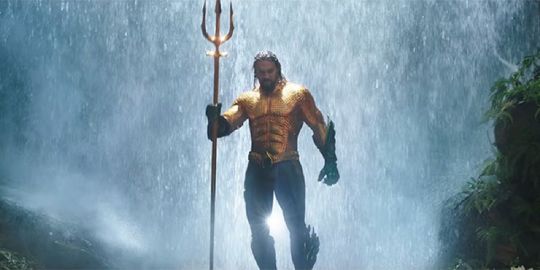
It's not only Wonder Woman who is gifted the power of the gods. Aquaman's DCEU movie finds the source of his power in the Trident of Atlan, the king who founded Atlantis. The trident was forged from the steel of Poseidon in the Kingdom of the Deserters, giving King Atlan mastery over the Seven Seas. The trident was used by Atlan for many purposes, including imprisoning the Karathen, a giant sea creature so powerful that even the king feared her. Atlan became too over-reaching with his use of the trident, and, during an experiment gone awry, the force of the trident released a great wave of energy that sunk Atlantis to the bottom of the ocean. Atlan felt palpable shame after the fall of Atlantis, exiling himself to the same abyss, the Hidden Sea, wherein he put the Karathen, admonishing her to protect the trident from all but the rightful heir to his throne.
When his mother's trident is destroyed, Arthur Curry makes a voyage to the Hidden Sea in order to retrieve the god's weapon and retake his rightful place as King of Atlantis. He proves himself worthy to the Karathen and the uses the trident to unite all creatures in the ocean. With the power of the Sacred Trident in his possession, Aquaman is able to defeat the armies of his enemies and become the hero of the waters both in the comics and in the DC Extended Universe.
More: Wonder Woman 1984 Theory: Asteria Is Also A Daughter Of The Gods
Wonder Woman: Everything Created By The Gods In The DCEU from https://ift.tt/3c2ozJp
1 note
·
View note
Video
youtube
@6:38 “Basic luciferianism is the idea of sympathy for the devil. It’s the idea that lucifer got the raw end of the deal. He’s the scapegoat. The one promised the world and sacrificed everything just because he wanted to enlighten god’s creation, mankind, and give them god-like status.”
This sounds interestingly similar to any of the savior stories. For all we know it’s two sides to the same coin. I find it even more interesting how now matter which side we ask--they all seem to be saved. This to me becomes sadly humorous because don’t most doctrines say that those saved are limited, far and few between? So what makes you so special sally joe righteous ego?
Was I ranting? I was ranting again wasn’t I? I’m not condemning christians and I’m not condemning anybody. This just sounds so much like different versions of the same story between all these religions and belief systems. Even more interesting to me is the fear that a lot of christians seem to have about these fallen ones, entities, aliens. Which...in essence is fearing god by fearing his creation(?)--as they were told to do oh faithful servants. Something we might want to consider though--is that if there IS actually some truth to some of these doctrines, it would behoove us to be informed so that we aren’t emotionally acting a fool.
Not to mention that the deep state, msm, luminati, and many other names have become louds whispers down the echo chambers. Every body seems to be woke. Now doesn’t that sound a little suspicious? Maybe that’s exactly part of the program Westworld.
Ultimately, I think fear is the enemy here. Fear is fabricated by nobody but your own mind.
Don’t get me wrong. I do believe that we (collectively) are being deceived and were given both the carrot and the stick, leading ourselves to our own righteous hell and demise, really. The reason I say this is because we (western society) are conditioned to believe that we have all of these problems and that if we can just get this or get that or have X then it will all be better. If we could just travel to space then we won’t have to be accountable for the planet we’ve destroyed. More so, we would have the space to grow and then our motives are endless from there. I think that’s ultimately the question we need to ask ourSelves. When is enough, enough? When will we realize the perfection in our imperfection? I think a lot of children and especially millennials can relate to this feeling of being ‘rejected,’ in a sense. I don’t know if it’s because our (collectively) parents were so busy working, or due to some of us not getting proper love, or....I mean there are so many deep psychological implications that are at play here that we can’t pin it down to any ONE factor. But to me, it’s quite obvious that the insecurities of humanity are shining strong and that we’re all looking for one thing: To be loved, unconditionally, as we are, without feeling we have to be something else. The catch is--We’re still trying to figure out who we are.
“When I say the dark sun, why the black or the dark sun? The sun represents light. It represents knowledge. It represents empowerment. It represents life. The antithesis of that, the total polar inversion of that, is it’s still a form of light it’s still the sun, but it has darkness within it. So it’s knowledge being used for all the wrong reasons. Knowledge being used to control, not enlighten, not uplift. Knowledge being used to put people in a prison. Knowledge being used as a power differential over people who are still in a level of ignorance. So you’re blinding people with that light and you’re enslaving them with it.”
MY POINT IS: How many of us can actually say that we are 100% grateful for our lives? Whether we viewed it as good or bad or whatever. Or, how many of us would go back and do something differently if we could? Or have different bodies, or completely different lives, and on and on. This is the abyss. If we can’t be grateful for what we’ve been given--Then what on this earth will we ever be grateful for? To infinity & beyond!
youtube
1 note
·
View note
Text
Interview: Jonathan Rogers, The Indiana Jones Interrogations

With Indiana Jones 5 in production, it’s a great time to be an Indy fan. There is, of course, still another two years before we see Harrison Ford’s return as the Man in the Hat, but that doesn’t mean there’s nowhere for us to get our adventuring fix.
Last year, Jonathan Rogers released The Indiana Jones Interrogations, a brilliant web series that saw Indy captured and questioned by his Nazi foes. You can watch the series here.
From Director Steven Spielberg spoke to Jonathan about the making of the series and his next endeavour: a Kylo Ren film.
1. Now that The Indiana Jones Interrogations is complete, tell us a little about Indy's arc through the series. How did you go about developing him and putting him through the emotional wringer?
It was a slightly difficult process, trying to find a satisfying climax to this story. In our last interview, I explained that a major goal of the Interrogations was to explore Indy’s moral ambiguity, and I feel like we’ve succeeded at that. We like to think the events of this story helped Indy reconsider some of his priorities in his life. Of course, some things stay the same (“Nazis, I hate these guys” as well he should!), but he now has a better self-awareness about his own faults, and tries to temper his more mercenary side by the time of Last Crusade’s events. And a big part of that, is (SPOILERS) Claire’s fate, leaving a huge mark on him. People are complex and mysterious creatures, and it was nice to play a bit with shades of grey through Claire. I would say Claire’s still not an especially good person, but in the end, she proved she had a sense of honor and loyalty to her old mentor. And Indy will have to live with the paradoxical knowledge that he, technically, owes his life to a Nazi.
2. You play Indy in the series as well as writing and directing it. What did you learn about playing the character as it went on? Was there anything you were doing with the character at the end of the series that you weren't at the start, and vice versa?
Definitely, to all of that. It wasn’t all my doing of course; a big part of the success of the series is the work by my co-stars Samantha Fairfield Walsh, Steve White and Rebecca Cardenas, and main producer Jonas Acuff who helped embellish the original vision I had. But for me personally, concerning the performance, it was a fun and enlightening experience.
I can recall early on, wanting Indy to start off as pretty true to what we know of him from the movies, as this wisecracking, defiant and abrasive adventurer. But it was always a goal to chip away at that as we went, and reveal Indy’s deeper insecurity, and thus bring to fans a new perspective on this iconic character, that the films only get to hint at. Overall I’d say we stuck to that game plan with limited diversions.
If there’s one thing I learned about Indiana from playing him, it’s that I now strongly believe it’s crucial to the character that he possess a dark side. The films have gone out of their way to scrub a lot of the grit off of his personality, and from an arc perspective, that’s fine... but the Indiana Jones most people love, is the one we saw in Raiders and Temple of Doom, the rugged adventurer with a good heart but also plenty of vices that always have him at risk of becoming no better than the Nazis or the Thuggees. Belloq said it best, it would take only a nudge to push him over the edge of the abyss.
Indy is a full-blooded anti-hero at the end of the day, and I think that’s very important to his enduring appeal. He’s the everyman as action hero: imperfect, constantly messing up, with a lot of areas to improve on. He is us. And yet… an exaggeration of us, a mythic power fantasy. This has always fascinated me about Indiana, and I feel proud to have done my part as a fan to add to his legend (as much as I can without being officially sanctioned by Lucasfilm, of course).
3. Looking back, if you could shoot the series again, is there anything you'd have done differently?
There will always be things you wish you’d handled better in hindsight. I know one of them, is wishing I had a more interesting ‘hook’ to explain Indy’s capture and interrogation, that had a greater sense of stakes to it beyond just indulging in more of Hitler’s paranoia. If I could redo anything, it would be that.
Otherwise, I think self-restraint is smart, haha. At some point, you have to accept that your work is complete, and has been released to the public, and now belongs to the world in some fashion. I am overall very proud of our creation, and feel like we did Indy justice. That’s the most important thing.
4. What tips do you have for any budding film-makers who may be considering creating their own fan productions?
Try to do something unique. Our mantra for any Shattered Star Productions project, is to try and do something creative and atypical with time-honored concepts or characters, and I think that’s a wise mindset for any kind of creative endeavour, and especially if it’s using trademarked characters or concepts. It’s so easy to just copy the popular trends, but it’s really when you dare to be different, that your work is going to stand out and be seen as worthy of people's interest. The magic combination of skill, creativity, boldness and a willingness to work with others will take your very far. And I wish the very best of luck to all aspiring fan filmmakers out there!
5. Along with Patrick Shoenmaker's animated showreel, 2016 was a good year for Indy fan productions. With Indy 5 on the horizon, how would you like to see Lucasfilm/Disney develop the character beyond the cinema screen?
Oh man, that short by Mr. Shoenmaker was marvelous. I personally would be all in for an animated series of some kind, done in that art style and with that level of clear affection for the genre. It’s fairly obvious to me that Indiana Jones 5 is meant to be the curtain call on Harrison Ford’s time in the hat, and once that is done, it only makes sense to try rebooting the character. I have no real idea what to expect, when that day comes. But personally, I am in favor of either the animated series route, or a live-action reimagining that can recapture the essence of classic Indiana Jones but hopefully remold it to be successful for our modern times.
6. Is the Indy world something you'd like to return to, or do you feel you've said everything you want to say about the character with The Indiana Jones Interrogations?
I will always be interested in doing something relating to Indiana Jones in some fashion, but I think this is it for portraying the character on camera in an actual production, for a good long while. Of course, I hesitate to give a definitive ‘never again’ kind of answer, but unless if some unique idea grabs me, or an opportunity comes along that has too much potential, this is honestly the best I can do to pay tribute to Dr. Jones. For now. I mean, anything can happen. It’s a long way to Delhi...
7. Finally, what's next for you and Shattered Star Productions?
We’re excited to be nearly completed with our next major fan film, a short film entitled “Kylo Ren: Smuggler’s Son”, due for release next month. It is a dark, atmospheric and character-centric prequel to Star Wars: The Force Awakens, that delves into the mysterious past of Kylo Ren, that film’s compelling and tragic villain. Yet another collaboration with Jonas Acuff, this was birthed out of a desire to show the intricacies and nuances of this character that a lot of people continue to misunderstand, and we hope it can do him justice. It will be released on our YouTube channel, our Vimeo channel, Twitter, and it’s own Facebook Page. We cannot wait to share it with fans, and hope it can make the long wait for Star Wars: The Last Jedi a bit more enjoyable.
Find out more about Jonathan and his production company Shattered Star Productions at the links below.
Website | YouTube | Tumblr | Facebook | Twitter
#Steven Spielberg#Spielberg#Indiana Jones#Indy#Indiana Jones Interrogations#The Indiana Jones Interrogations#Star Wars#fan films#Kylo Ren
5 notes
·
View notes